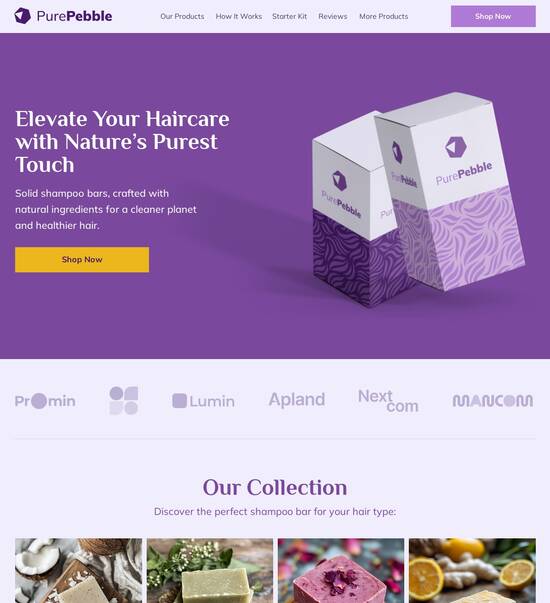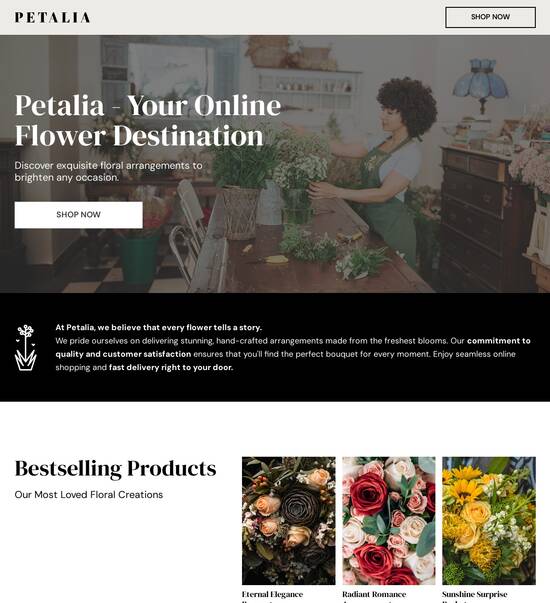
Web page template with interactive user registration form
Explore Similar TemplatesAbout template
Use web page templates with interactive user registration form and make your communications easy and transparent. Try our solution today.
Recommended templates

Easy to build without coding
With the intuitive drag-and-drop builder, anyone on your team can create high-converting pages without any knowledge of code or design. Make enhancements to your landing page with custom widgets using Javascript, HTML/CSS, or third-party scripts.

Multiple layouts for any industry and goal
Select from 500+ landing page layouts built to boost conversions across industry-specific scenarios. Customize them by adjusting fonts, adding images, and generating on-brand content with the AI assistant. Quickly scale with Instablocks® and Global Blocks that you can save, reuse, and update globally.

Loads fast and looks polished on any device
Every template is responsive, which means they present professionally on any device and load blazingly fast with our Thor Render Engine. You can also power them up with Google AMP technology to deliver an unparalleled mobile experience and drive higher conversions.

Robust analytics & experimentation
Get real-time updates and reporting across all your devices, showing the number of visitors, conversions, cost-per-visitor, and cost-per-lead. Launch AI-powered experiments, run A/B tests, and use heatmaps to analyze user behavior, then optimize your landing page to maximize conversions.







Easy to build without coding
With the intuitive drag-and-drop builder, anyone on your team can create high-converting pages without any knowledge of code or design. Make enhancements to your landing page with custom widgets using Javascript, HTML/CSS, or third-party scripts.
Multiple layouts for any industry and goal
Select from 500+ landing page layouts built to boost conversions across industry-specific scenarios. Customize them by adjusting fonts, adding images, and generating on-brand content with the AI assistant. Quickly scale with Instablocks® and Global Blocks that you can save, reuse, and update globally.
Loads fast and looks polished on any device
Every template is responsive, which means they present professionally on any device and load blazingly fast with our Thor Render Engine.
Robust analytics & experimentation
Get real-time updates and reporting across all your devices, showing the number of visitors, conversions, cost-per-visitor, and cost-per-lead. Launch AI-powered experiments, run A/B tests, and use heatmaps to analyze user behavior, then optimize your landing page to maximize conversions.
All the features you need to build registration form website template
Explore more featuresLearn how to build website registration template
Frequently asked questions about web registration template
Leading the way in building high-performing landing pages





Registration site template: Your ultimate how-to guide
Creating a web page template with an interactive user registration form can significantly enhance lead generation efforts and improve user engagement. Instapage offers robust solutions that empower marketers to easily design high-converting registration forms within their landing pages. This guide will walk you through the process of leveraging Instapage's features to create a compelling user registration experience.
Understanding the importance of user registration forms
User registration forms are crucial for collecting essential information that can drive future marketing efforts. By encouraging users to sign up, businesses can build a targeted email list and foster relationships with potential customers. An optimized user registration form can lead to better engagement and a higher conversion rate, setting the stage for successful campaigns.
- Capture valuable customer data: Effective registration forms allow you to gather information such as names, emails, and preferences to tailor your marketing approach.
- Enhance user experience: A well-designed registration form creates a seamless workflow, making it easy for users to sign up without frustration.
- Support marketing automation: User data obtained through registration can be integrated with your CRM and marketing automation tools to streamline follow-ups.
Step 1: Design your web page template
Begin by selecting a high-converting template from Instapage's extensive library. Choose one that complements your branding and aligns with your campaign goals. Keep in mind the following design elements:
- Use a clean and simple layout: This ensures your registration form is easy to find and fill out, reducing user dropout rates.
- Incorporate eye-catching calls to action (CTAs): Use contrasting colors and action-oriented language to encourage users to sign up.
- Mobile optimization: Ensure your design is responsive and works seamlessly on mobile devices to capture a broader audience.
Step 2: Implement interactive elements
Adding interactive features can significantly improve the user experience. Use Instapage’s variety of tools to make your registration form engaging:
- Dynamic text replacement: Tailor the content according to where the user is coming from to create a personalized experience.
- Progressive disclosure: Show only essential fields initially, gradually revealing additional fields to avoid overwhelming users.
- Visual feedback: Use animations and simple error messages to guide users during the registration process.
Step 3: Optimize and test your registration form
After setting up the template and integrating interactive elements, it's crucial to optimize and test your registration form for best results. Follow these steps:
- A/B testing: Experiment with different headlines, CTAs, and design layouts to see what resonates best with your audience.
- Analytics integration: Utilize heatmaps and behavior tracking to understand how users interact with your registration form.
- Feedback loops: Continuously gather user feedback and make necessary adjustments to improve the registration experience.
By following these steps, you can create a web page template with an interactive user registration form that not only captures leads but also enhances user engagement.
Don’t miss out on the opportunity to streamline your lead generation process. Start building your custom registration forms today with Instapage and witness the transformation in your marketing campaigns.
People also ask about registration website template
Harnessing the Power of Web Page Templates with Interactive User Registration Forms
Understanding the landscape of user registration on websites
User registration forms are crucial components of modern websites. They act as gateways that facilitate not only access to services but also the collection of essential data. When users register, they provide information that helps organizations tailor their offerings and create targeted communication, thus enhancing the user experience.
Moreover, user registration fosters a sense of community. It allows platforms to build a base of engaged members who actively participate and contribute content, leading to vibrant online interactions. Over time, these interactions can evolve into user-driven feedback loops, which further refine the website's offerings.
The ability to facilitate personalized experiences cannot be overstated. With the right data gathered at registration, websites can customize user experiences by suggesting content, creating tailored marketing strategies, and personalizing user interactions to increase retention and engagement.
Current trends in web design for registration forms
User-centric design has emerged as a prevailing trend in web design. This approach emphasizes minimalist layouts that prioritize ease of use and navigation, ensuring that users can complete registration with minimal friction. A clean interface is not only visually appealing but also significantly reduces the cognitive load on users.
The rise of mobile-optimized forms reflects the increasing use of smartphones for web browsing. Templates designed for mobile use ensure that registration forms maintain their functionality and appeal across various devices, enabling smoother experiences for all users.
Additionally, animations and micro-interactions have started to play a significant role in modern web design. Subtle animations can draw attention to critical areas of a registration form, guiding users through the process in an engaging manner without being overwhelming.
The role of innovative templates in modern web design
Innovative web page templates streamline the design process for developers by providing ready-made structures that can be adapted for various purposes. These templates help reduce the time needed for prototyping and implementing user registration forms, allowing creators to focus on other aspects.
Customization options within these templates allow businesses to align them with their unique brand identities. This flexibility ensures that the registration forms not only function well but also visually represent the brand's ethos and values.
Furthermore, integration capabilities with social media platforms simplify user registration. Users can quickly sign up using their existing social media accounts, enhancing convenience and fostering a larger pool of users who are likely to convert.
Features of an interactive web page template with user registration form
A well-designed template for an interactive user registration form includes several essential components. First, a clean and responsive layout ensures the form is accessible and visually appealing on both desktop and mobile devices. Attention to detail in design elements, such as fonts and colors, enhances brand representation while maintaining user focus.
In addition, these templates offer pre-built sections tailored for specific industries or purposes, such as education appointments or service bookings. This specificity can significantly reduce the time and effort spent configuring generic forms.
Functionality at a glance
User interface functionality also plays a critical role in creating an effective registration experience. Real-time validation of user inputs helps prevent errors by alerting users when information entered is incorrect or incomplete. This immediate feedback can reduce frustration and increase the likelihood of successful registration.
Dynamic field adjustments based on prior responses can tailor the registration experience, allowing users to engage with forms that feel personalized to their needs. For instance, a user who indicates they are registering for a specific service can be shown relevant fields, making the process efficient and targeted.
Configurable action buttons guide users through the registration flow. Clear 'Submit' or 'Next' buttons, strategically placed, keep users engaged and minimize the chances of drop-off during this critical point in the engagement funnel.
Social media integration
Integrating social media options into registration forms allows users to create accounts more quickly by leveraging existing credentials. This process streamlines user onboarding and increases conversion rates, as users are often more likely to register if it requires fewer steps.
The cross-platform membership benefits that arise from this integration allow users to easily share their experiences, thus promoting services through social proof. Users are more likely to trust systems that utilize recognized platforms, enhancing the registration experience.
Crafting a seamless user experience in registration forms
Designing registration forms with accessibility and inclusivity in mind ensures that all users can engage without barriers. Utilizing strong color contrast and appropriate font sizes enhances readability. Moreover, implementing ARIA landmarks for screen readers facilitates navigation for visually impaired users, making the registration process more equitable.
Mobile-friendly designs are essential as many users access websites through smartphones. Optimizing layout and functionality for mobile devices ensures that users experience seamless registration regardless of their chosen platform.
Creating an engaging flow for user interaction
Creating an engaging flow during user interaction includes using progress indicators for multi-step registration forms. Such features give users a clear understanding of where they are in the process, reducing anxiety and improving completion rates. Various tools and indicators assist in guiding users and preventing confusion.
Including tooltips and placeholders in form fields provides additional guidance without cluttering the interface. Clear instructions on how to fill out each section can expedite the registration process and improve user satisfaction.
Lastly, establishing clear direction in form filling, such as providing educational appointment contexts, can enhance user understanding and compliance, leading to higher conversion rates.
Testing and optimizing the user journey
Constant testing and optimization of the user journey are vital to maintaining a high-performance registration process. A/B testing different layouts and field placements can yield valuable insights into user preferences, allowing for data-driven adjustments.
Gathering user feedback through analytics and surveys can provide qualitative insights that complement quantitative data. This information empowers marketers and developers to refine their approaches, ensuring a user-friendly environment.
Continuous refinement based on user behavior data fosters an environment that can swiftly adapt to user needs, ultimately enhancing user satisfaction.
The benefits of utilizing a registration form template
Utilizing a registration form template accelerates project development time, reducing the hours spent on design iterations. Templates streamline processes for both developers and designers, allowing teams to focus more on crafting exceptional experiences rather than starting from scratch.
Moreover, optimized forms can lead to enhanced conversion rates. By analyzing user drop-off points, organizations can identify and improve problematic areas within forms. Implementing strategies for compelling calls to action on buttons can further entice users to complete registrations.
Building long-term relationships with website users
Establishing personalized communication after registration is paramount in building long-term relationships with users. Tailoring follow-up messages and recommendations based on user data can significantly enhance user loyalty and engagement.
Strategies for retaining users can include providing tailored educational resources and appointment systems that meet specific needs. These approaches transform a one-time registration into an ongoing relationship, fostering loyalty and community.
Real-world applications and case studies
Numerous websites have successfully implemented interactive registration forms and have witnessed significant improvements in user engagement. Features used in these successful applications range from streamlined input processes to dynamic content tailored to user interests.
Specific data such as conversion rate metrics before and after implementation highlights the effectiveness of these forms. Websites across varied sectors, from e-commerce to education, have adapted forms in unique ways, catering to their specific user bases.
Comparative analysis of different registration solutions
When comparing static forms and interactive templates, the differences in user engagement and completion rates are striking. Interactive templates often result in more favorable outcomes, making them a cost-effective choice for businesses aiming to improve their registration processes.
The return on investment in modern registration strategies becomes evident when considering user testimonials and feedback. Positive experiences among users who interacted with these forms illustrate their impact on user behavior and satisfaction.
Future trends in user registration forms
The influence of AI and automation will continue to reshape user registration experiences. By employing AI, businesses can create personalized registration journeys that respond to user behavior in real time. Predictive analytics can help anticipate the next steps users may wish to take, making the process even more seamless.
Additionally, privacy and security enhancements remain at the forefront of user concerns. Implementing secure data handling practices not only builds trust but adheres to user preferences regarding privacy and data usage transparency.
Evolving user needs and expectations
User demographics are shifting, necessitating adaptable solutions that cater to a diverse audience. Staying attuned to the technological advancements driving form design evolution is critical for maintaining relevance in a fast-paced digital landscape.
Incorporating gamification elements in forms may also be on the horizon, as users increasingly seek engaging and interactive experiences. Anticipating such user desires will aid businesses in cultivating more engaging registration processes, thus enhancing user satisfaction and retention.
Ready to skyrocket conversions?
Supercharge your ad campaigns with high-performing landing pages
Get started














